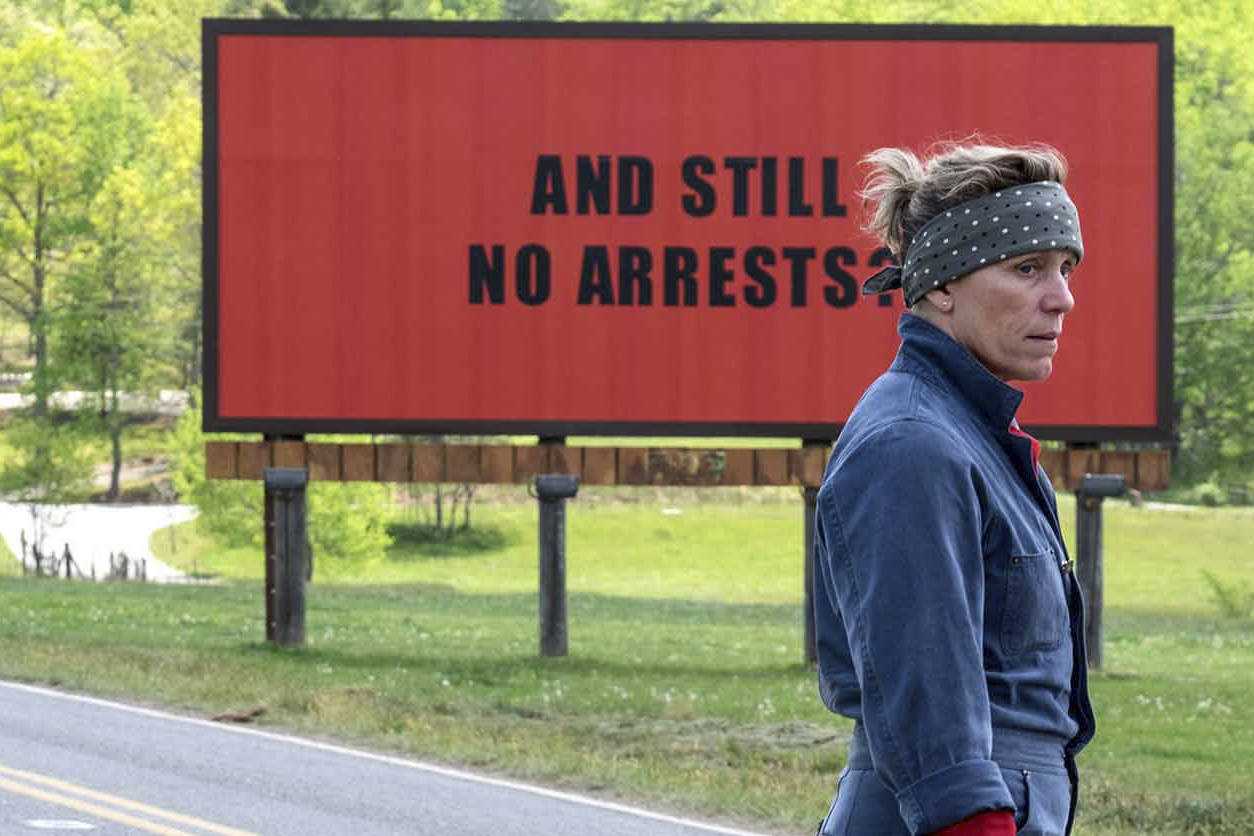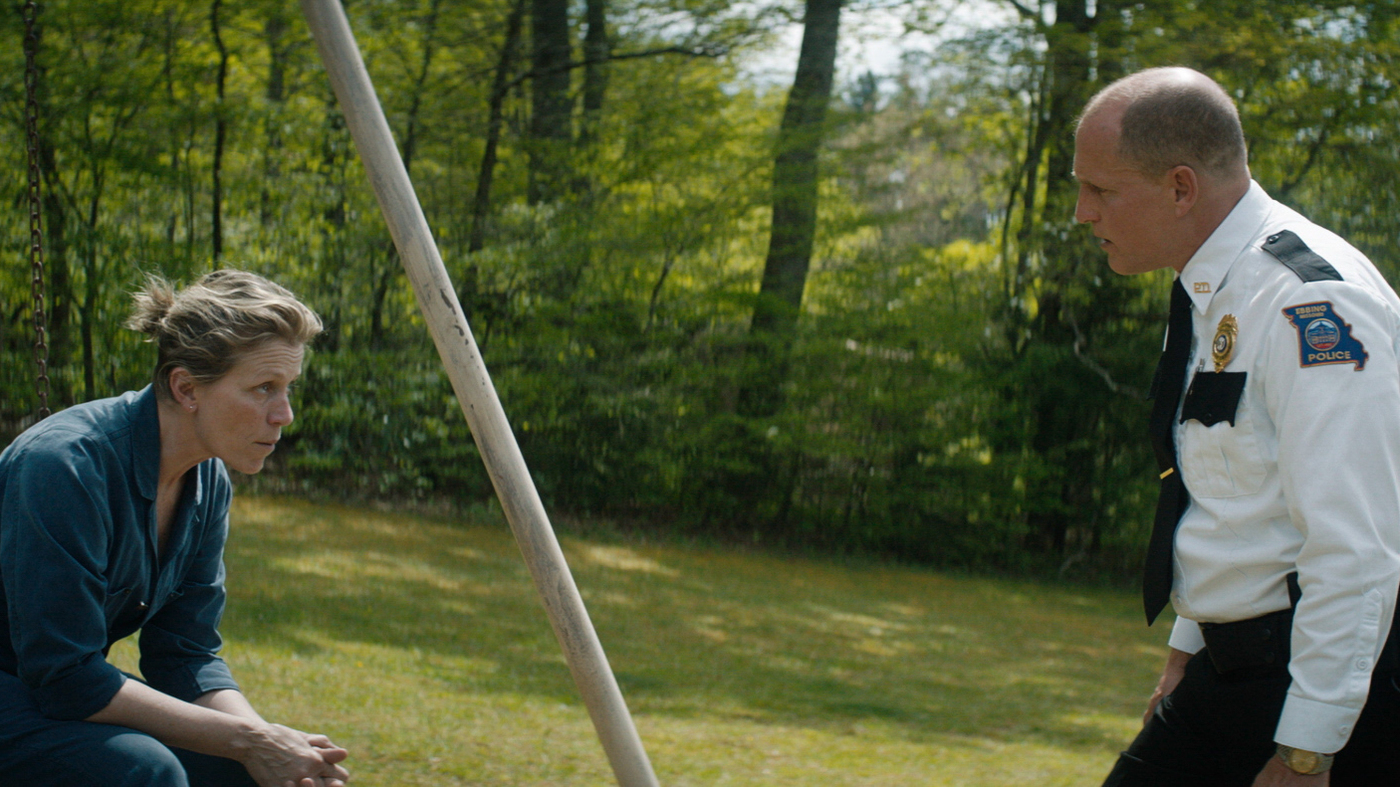Wwe’re just in January but “Three billboards outside Ebbing, Missouri” seems already one of the most talked-about movies of the year (to come). The brainchild of the caustic Anglo-Irish playwright and director Martin McDonagh, “Three billboards etc..” has the great perk of being wholly unpredictable, as it plays with the pulp genre, almost touching it and then turning at the very last minute. All agreed in celebrating McDonagh’s genius? Not exactly, as you can see from the reviews of AsinoVola’s newsroom.
Three Billboards outside Ebbing, Missouri – seen by Margherita Fontana
Ebbing, Missouri. Mildred Hayes decides to speak out against the police lack of interest in her daughter’s death by putting up three big billboards along the road where the 19-year- old Angela was raped and killed. The message is addressed in the first place to the sheriff Bill Willoughby (Woody Harrelson), valued member of the community and who has terminal cancer. The clash between these two characters triggers the narrative mechanism of the film, which is focused on the stories of the people in this little and closed community. In the tragi-comedy created by the author of Seven Psychopaths, everyone hurts everyone: violence and resentment are endemic in every level of society. Mildred, masterfully played by Frances McDormand (for this part winner of the Golden Globe), is the centre of all contradictions which make the film’s structure: she is the grieving mother wilful to obtain justice for her daughter, but also the responsible of a raging revenge, never stopping being the victim of her former husband brutality. Nevertheless, what we can say about Mildred is true for every character who inhabits McDonagh’s imagery: the preconceived ideas we tend to develop as spectators are promptly proved wrong, or insufficient, by the plot’s development. Three Billboards is an ambitious work, in balance between surreal comedy and personal drama, nourished by extraordinary actors, able to give substance to existential complexity in every figure. The most fascinating thing about this film is its ability to treat burning issues of contemporary America, without falling into the temptation of a moralistic critique. There are no good, neither bad people, and that is maybe the reason why in the end everyone is saved.
Three Billboards outside Ebbing, Missouri – seen by Yorgos Kostianis
“Anger begets more anger…” that is the impetus behind Martin McDonagh’s third feature film. And while, there’s admittedly no scarcity of films that grapple with this very notion, very few of them have such an unconventionally humane and surprisingly hilarious take on the subject like “Three Billboards outside Ebbing, Missouri”. The idea for this film came to McDonagh back in the nineties, while he was riding on a Greyhound bus through the American deep south and he spied a couple of billboards, in a barren field, with a rageful message calling for justice. Thus, he devised the character of Mildred Hayes, written with none other but Frances McDormand in mind, in a role that will arguably secure the actress her second Oscar. Mildred is a bereaved mother whose daughter Angela was raped and murdered less than a year ago, but the case has gone cold. Fed up with the lackadaisical local law enforcement she decides to rent the three massive billboards looking over the crime scene and have them emblazoned with black lettering on a red background reading:
“RAPED WHILE DYING
AND STILL NO ARRESTS?
HOW COME, CHIEF WILLOUGHBY?”
Those three telegraphic phrases meant as a cry for help will end up precipitating her and her fellow countrymen into a downward spiral of violence and vengeance. The fictional, blue-collar town of Ebbing filled with “good country people” seems like something straight out of a Flannery O’Connor novel whose bleak, existential humour the director seems to be trying to channel, as is made clear in the very beginning of the film, where a character is reading “A Good Man is Hard to Find”. If you add to that a conspicuous influence by the Coen brother’s black comedy and the stellar supporting cast also featured in his previous works, it’s no wonder why McDonagh’s film is a recipe for roaring success.
However, the film belongs to Frances McDormand, a force to be reckoned with. Her Mildred is a flinty, take-no-prisoners, no-bullshit, ass-kicking, recently divorced, middle-aged mother that can do more with a scathing glare than most actresses can do with a monologue. Yet, it’s precisely due to her checking so many boxes in relatability that the viewer finds it so increasingly difficult to justify her indefensible actions throughout the film. McDonagh’s filmic world is not one of absolutes. He spares no character from glaring flaws and dubious moral compass. He alludes to forgiveness, redemption and love as a way out from this southern purgatory of his own making but deliberately refrains from ensuring the audience that his characters have it in them to take this path. By the same token, the screenplay and the characters tend to overpower the rest of the movie’s filmic aspects. Contrary to O’Connor or the Coens, McDonagh’s attachment to his well-crafted, fleshed out characters slightly undermines the credibility of the script and shields them from the consequences of their actions despite the gratuitous violence they endure. All things considered, the film’s line between comedy and drama or screenplay and cinematography may be a tad blurred, but McDonagh’s directing steps towards new uncharted territories is a much-needed breath of fresh air and solid proof of his capabilities.
Three Billboards outside Ebbing, Missouri – seen by Carlotta Magistris
Frances McDormand, arguably the greatest American living actress, an always impactful Woody Harrelson, a moving Sam Rockwell: Martin McDonagh, film director with a non-meaningful career, helped by one of the best cast you can wish today in America, smartly devises and writes a Coenian movie which is maybe too easily considered as one of the most interesting films seen lately. The plot is flawless and tight with some light ethical reflections where everything is in its right place, ending in a non-trivial but maybe too open-ended way: the movie is a “must-see”, it smartly entertains above average but in the end, it doesn’t surprise and cannot be considerate – and considerable – an art film.
Three Billboards outside Ebbing, Missouri – seen by Elena Saltarelli
Difficult to write about this movie. To include it in a genre would be to cage it into a unilateral emotional range, which is something quite far from the essence of Three Billboards.
The third movie directed by Martin McDonagh, Three Billboards finds its centre in Frances McDormand, winner of the 2017 Golden Globe for Best Actress in a Motion Picture. A divorced mother worn out by the murder of her daughter, Frances/Mildred pays an ad company to put up three billboards with accusing questions addressed to the local police, guilty for not having caught the rapist and murderer. In this scenario, the drama is filled with noir comedy dialogues that give no quarter, never vulgar in the eyes of the knowing spectator.
Elegance runs side by side with anxiety, as we find ourselves among redneck policemen, violent yet incredibly sweet; in the background, the scolding American community, challenged by a woman alone. Can we really draw the line between human goodness and evil? Can we laugh and cry for the same event? McDonagh shows us that contrasts, when well built, are what art is made of and perfection is boring. It is up to us to accept it if we really want to see.









Commenti recenti